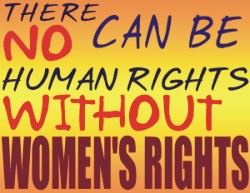Human Rights Monitor
Women's right to marital property
Syeda Nasrin
 |
Photo: pakistanlaw |
Women's right to marital property is somewhat an unknown concept in Bangladesh. This ignorance is largely due our indifference to women's contribution in developmental process. Despite significant development in political empowerment of women in the country, no mentionable progress has been achieved in terms of women's access to marital property. Human rights campaigners are not seen to be vocal on this issue. Why we are so ignorant or unwilling to talk about this right? Where the causes are rooted? It is unlikely that male counterpart of a family will speak for the female counterpart. The husband will not talk about assurance of women's right to the marital property because assurance of this right will hold him as duty-bearer and women as right-holder.
In fact, the subject-matter that construes the right of the women to 'her marital property' does not make her male counterpart as duty-bearer. This is the mere real property whereupon the right of a married female is to be ensured as to proprietary interest in that property. 'Property' includes both moveable and immoveable properties. The question is: what constitutes marital property? Marital property includes properties obtained and earned either by the wife or by the husband individually or mutually at and since the day of their mutual converting into 'couple' (legally recognized husband/wife relationship) extending to the whole period of this relationship. It also includes properties irrespective of those registered in their joint names or personal name during their marriage period. In our country marital property has no distinctive legal caption or identification. After being separated from her husband, a divorced woman is driven away not only from her family life but also from the house where she lived in and contributed to build-up with her great hope, love, aspiration, sacrifice, day-to-day passion, physical and mental industry, earned income since the day of her marriage. But after being divorced, all her contributions are not only notoriously ignored but also completely denied by the society and law at large.
Even, nobody feel shy to denounce and overlook her passionate contribution to her ghar-shangshar (family and house). A housewife sacrifices all her concentration, physical and mental industry to the maintenance, promotion and development of the family. But after divorce, it is the wife who has to leave that house empty hand only being awarded a nominal maintenance for 3 (three) months only (even it is very tough to recover).
 |
Photo: divorce.lovetoknow |
This scenario is much more upsetting in case of a married working women who has to take double pressure at the same by maintaining the family and work outside. Generally in our society a married working woman is seen to expend all her personal earnings in family expenditure because upon marriage, the husband and wife became one person in the eye the law and society as well, as the property of the wife was surrendered to her husband and her legal identity ceased to exist. In large number of cases, all the properties of the wife, even the real or personal properties earned and obtained by her personal capacity and authority, are also surrendered to her husband losing all her personal ownership of the property. It is often seen that any personal property acquired by the wife during the marriage, unless specified that it was for her own separate use, goes automatically to her husband. If a woman was given a gift of Tk. 10,0000 from her grandfather before marriage, that money would pass to the husband afterwards at the desire of that wife or upon the pursuance of the husband, for instance. Contribution from her personal earning in the family expenditure is equally ignored and after divorce she has to leave the house empty hand.
When this is the scenario, it will be interesting to note the role of our judiciary who are empowered to secure the ends of justice in our society. My concern here is not for the law-makers who are condemned as politically motivated and whatever they think and do almost caused for securing their ulterior purpose i.e. 'power'. My point doubts the role of the judiciary whom we do rely/trust and expect. It is the judiciary who can play a dynamic and significant role to free our society from darkness, who can think about doing more justice than that of the previous, who has the courage to break down the existing superstitions of the society.
Our judiciary can play great role to this effect as the previous role of our judiciary followed in several landmark judgments including in 8th Amendment Case, 5th Amendment Case, Masdar Hossain Case etc. The High Court Division had already tried a bold attempt in Hefzur Rahman Case to award maintenance to a divorced woman till her death or remarry though in a limited extent but undoubtedly to an extended way than that of the existing scenario. But this little bit attempt was overruled by the Appellate Division in a midway [Hefzur Rahman Case v. Shamsun Nahar & Another, 51(1999) DLR (AD)]. Despite that, if our judiciary so wishes, it still can take the opportunity by considering the practical necessity and gathering reference from the foreign development and international instruments in which Bangladesh is a signatory member state.
Now-a-days women's direct and indirect contribution to the family is equally valued in many countries of the world including United States, United Kingdom, Australia, Mongolia, Malay and even to certain extent in India and Sri Lanka. Moreover, under international human rights law, women have a right to own and administer property without discrimination (UDHR; arts. 2 and 17, CEDAW, art. 15), and to an “equal treatment in land and agrarian reform” [CEDAW, art. 14(2)(g)]. Within the family, both spouses have equal rights in the “ownership, acquisition, management, administration, enjoyment and disposition of property” (CEDAW, art. 16).
Women's water rights are protected by article 14(2)(h) of the CEDAW (right to adequate living conditions, including in relation to water supply); rights to potable water are also linked to the right to adequate food recognized, without discrimination, in article 25 of the UDHR and article 11 of the ICESCR. The Resolution 15 (1998) of the Sub-Commission on the Promotion and Protection of Human Rights (entitled “Women and the Right to Land, Property and Adequate Housing”) stated that discrimination against women with respect to acquiring and securing land constitutes a violation of human rights law and urged governments to amend and/or repeal discriminatory laws and policies to encourage the transformation of discriminatory customs and traditions (paras. 1 and 3).
The preamble of the Convention on Biological Diversity recognizes women's “vital role” in the conservation and sustainable use of biodiversity and affirms the “need” for their participation in policies concerning these issues (para. 13). Gender-specific provisions are also embodied in the 1994 Convention to Combat Desertification, which provides for the facilitation of women's participation in efforts to combat desertification at all levels and specifically for their effective participation in national action programmes and as an instrument for capacity building (arts. 5, 10 and 19). Principle 20 of the Rio Declaration states that “women have a vital role in environmental management and development” and that “their full participation is therefore essential to achieve sustainable development”. The World Food Summit Plan of Action (para. 16(b)) and the Beijing Platform for Action envisages legislative and administrative reforms to ensure gender equality in access to natural resources, including inheritance and ownership rights (para. 61(b)).
So it seen than state is under an obligation to ensure women's access to marital property. The rightful distribution of marital property is also a question of justice. A society based on discrimination can not sustain at all. The issue of women's access to marital property should receive more impetus in realizing women's right in order to build a just society.
The writer is a Legal Associate at Hoque & Associates, Dhaka.